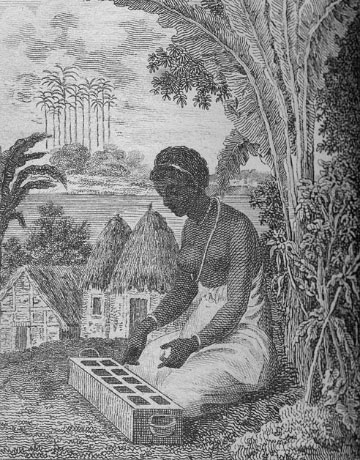Belinda mid-18th c. — late 18th c.

Belinda is most famously recognized for her 1783 petition to the Massachusetts General Court for a pension from the estate of her former master loyalist Isaac Royall, Jr. Belinda’s and many other enslaved people’s petitions demonstrate their courage and perseverance in demanding their liberty. The petition also provides an account of Belinda’s life in Africa, her experience during the Middle Passage, and her enslavement in America.
The Royall family held Belinda for fifty years. During this time, she had two children: a son Joseph and a daughter, Prine. During the American Revolution, Isaac Royall, Jr., Belinda’s master, sought refuge in England, leaving Belinda and her children behind. He died in England in 1781, and in his last will and testament stipulated that if Belinda chose to be free she should receive a pension of £30 for three years.
Two years later, in 1783, Belinda petitioned the Massachusetts General Court for the payment of this pension. The petition describes how Belinda was viciously snatched from her home near the Volta River in modern Ghana at age twelve. It tells of her horrific journey across the Atlantic and her enslavement in Massachusetts, in North America. The petition asks the Massachusetts General Court to order that the pension from Isaac Royall, Jr.’s estate be paid to Belinda and her daughter Prine, as it would “prevent her and her more infirm daughter from misery in the greatest extreme, and scatter comfort over the short and downward path of their lives.”
The request was granted and the executor of Isaac Royall, Jr.’s estate was ordered to pay fifteen pounds and twelve shillings annually to Belinda and her daughter. However, only one payment was made, and in 1787 Belinda again petitioned the Massachusetts General Court. The petition was approved, and Belinda received her pension for three years. In 1790, the executor of Isaac Royall’s estate refused to pay Belinda’s annual pension without an order from the Massachusetts General Court. The court ordered that the executor continue payment of the pension.
Belinda’s petition was but one among many from enslaved and formerly enslaved people to the Massachusetts General Court between 1765 and 1783. Some of these petitioners requested emancipation and relief from bondage. Others, like Belinda, argued for financial compensation for time spent in slavery—an early effort to seek reparations for their suffering.







